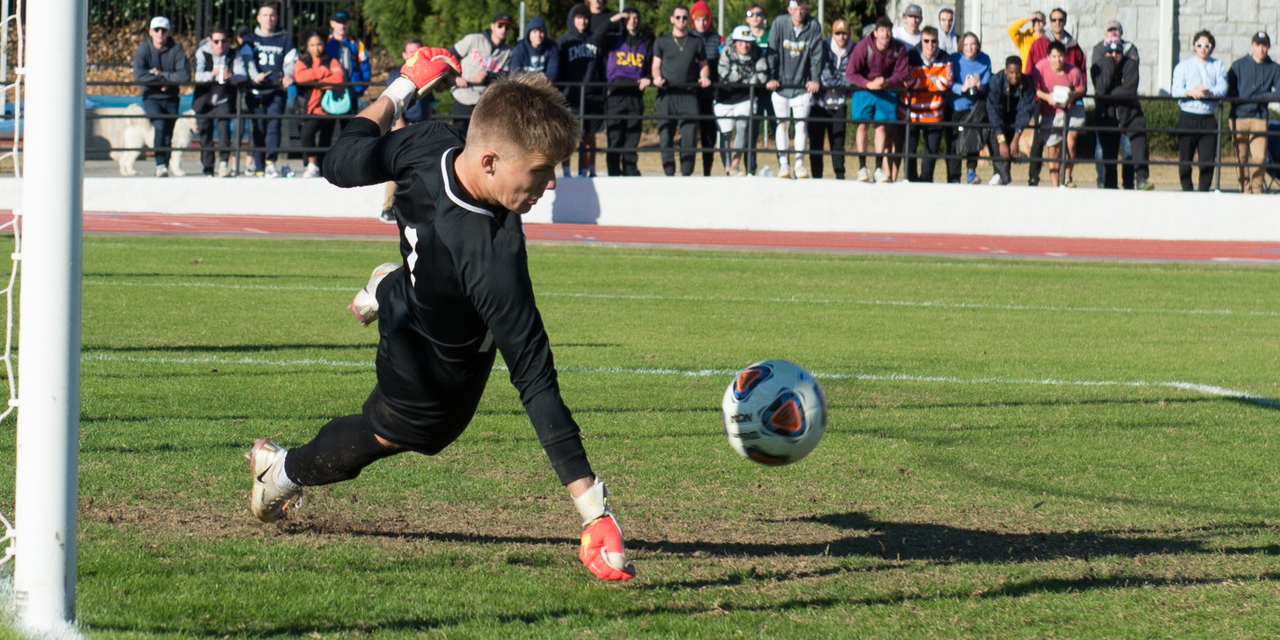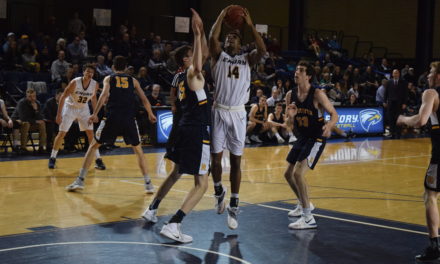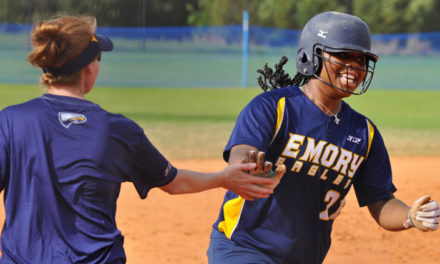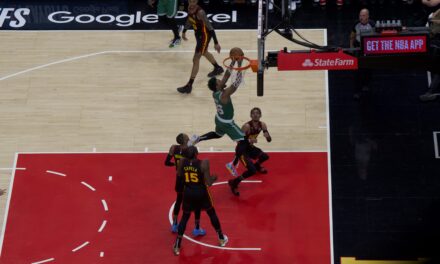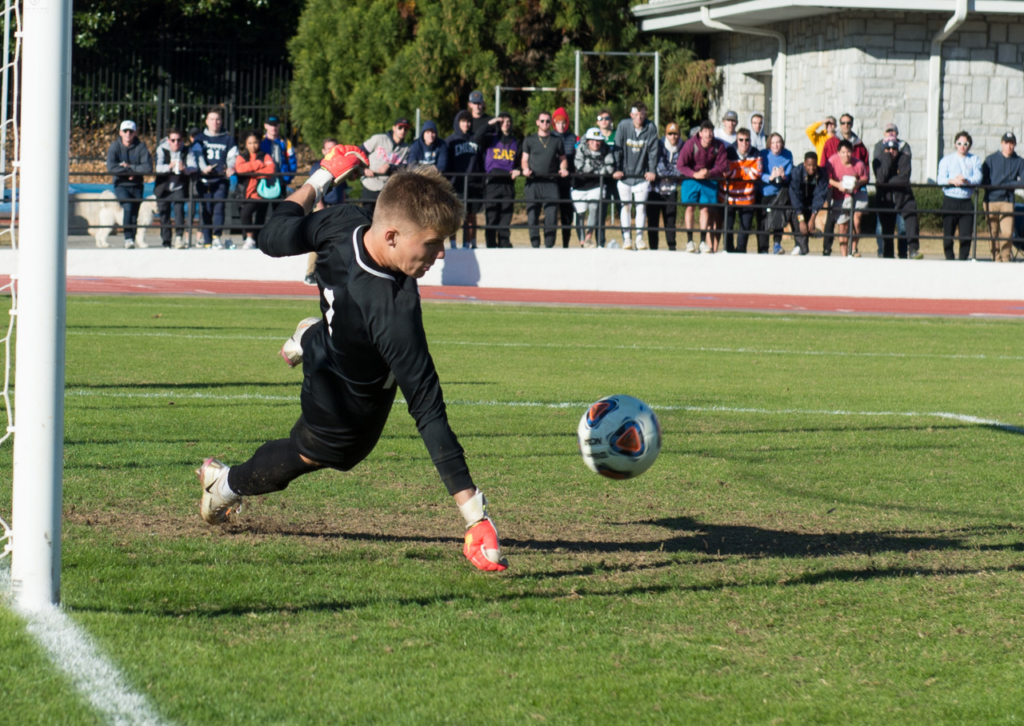
Goalkeeper Jack Hudson blocks a goal attempt with his forearm as Emory fans watch. (Courtesy of Jack Hudson)
Student-athletes at Emory University relish the challenge of playing in the University Athletic Association (UAA) while attending an academically rigorous school. Every year, 533 athletes across 19 varsity teams compete with different aspirations. They chose Emory in hopes of winning conference titles, going to national championships and developing their skill sets. The UAA is a competitive conference, so Emory athletes are expected to compete at the highest level. With 32 NCAA championships and 217 UAA titles, Emory’s teams have risen in the ranks of college athletics.
Due to COVID-19, the NCAA granted athletes who lost seasons an extra year of eligibility, providing an opportunity many would not have originally thought possible: moving from the NCAA Division III (DIII) to Division I (DI) level to continue playing the sport they love.
Former Emory men’s soccer goalkeeper Jack Hudson (22C) is currently pursuing a master’s degree in public health and playing at the DI level at the University of Alabama at Birmingham (UAB). He began his undergraduate soccer career at the DI level playing for the University of Kentucky. However, Hudson was not a starter on their team, so he transferred to Emory after two years, hoping to earn regular game time.
Hudson joined Emory’s team during the pandemic and did not have a regular fall season. Instead, he practiced multiple times a week at the Kaminsky Field with his new teammates. Hudson even drove to the field with his father at 6 a.m. for extra goalkeeper training to make the most out of a tough COVID-19 experience.
Hudson finally had a normal season during his senior year at Emory. He made 65 saves and let in an average of 0.75 goals per game, which earned him a place in the 2021 All-UAA First Team. Hudson said that one of the season’s highlights was making a crucial save in the first round penalty shoot-out against Centre College (Ky.), which helped the team advance to the next round.
However, for Hudson, the relationships he cultivated both on and off the field were the paramount factor of being a student-athlete at Emory.
“The teachers were amazing; The people, my friends, are the best friends that I have,” Hudson said. “Outside of [COVID-19] … playing was everything that I could have asked for, as well.”
Hudson said he was already thinking about returning to the DI level before he finished playing at Emory. Emory Men’s Soccer Head Coach Cory Greiner and Associate Head Coach Clayton Schmitt helped him get in contact with DI teams, including UAB. In his first season at UAB, Hudson led the American Conference with 60 saves and ranked second in saves per game (4.29) and save percentage (.759).
Having found success at both the DI and DIII level, Hudson said athletes moving between divisions should never doubt whether they are “good enough” — success is possible at any level with hard work and commitment to improving.
“I’ve found that the main differentiating factor between DI and DIII and DII is, first of all, your own level of commitment that you’re willing to put into your sport,” Hudson said. “There are so many amazing DIII players … so I don’t know if the level is really something you should concern yourself with. It’s just about what you’re willing to do to get to that level.”
Former Emory men’s basketball forward Matthew Schner (22B) also jumped from the DIII to DI level. During the 2022-2023 season, he played for Lipscomb University (Tenn.) while pursuing a master’s degree in business administration. Schner agreed with Hudson that athletes going from a DIII to a DI team should not doubt their abilities.
“The first part of advice I have is understand that you belong there, and you’re there for a reason,” Schner said. “I think the confidence jumps sometimes can be a challenge on people where they’re not sure if they’re good enough to play at that level. But, the reality is that the jump is not too crazy.”
Schner joined Emory’s basketball team as a freshman in 2017, but he encountered an early setback when he broke his foot two weeks into the season. Schner played his first two official seasons as a sophomore and junior. However, he decided to take a gap year before his senior season in order to have a regular final season. Schner said that having to take a year off from Emory basketball made it more special to come back after his gap year.
Schner had an incredibly successful basketball career at Emory. He earned a spot on the All-UAA First Team three years in a row, was named the UAA Player of the Year during his senior season and helped the team win two UAA Championships in 202o and 2022. Schner set multiple records, including the UAA record for points scored (347) and field goals made (140). He also holds the Emory program records for average minutes played per game (33.6) and single-season scoring (611).
Schner said he found a family in the Emory basketball community. Schner was incredibly close with his teammates, and he learned important lessons from Emory’s Men’s Basketball Head Coach Jason Zimmerman that helped him grow as a player and a person. Schner said that leaving Emory for his final year of eligibility was “one of the hardest decisions” he had to make, but he decided it was the right time to try something new at Lipscomb.
“I wouldn’t trade any of my experiences this year at the Division I level for anything I had at Emory,” Schner said. “[Playing basketball at Emory] was the highlight of my academic and athletic career.”
Like Hudson and Schner, Emory baseball senior outfielder Ellis Schwartz (23C) and senior pitcher Aaron Mishoulam (23C) will use their extra year of eligibility to play at the DI level. Schwartz will play at the George Washington University (GWU) (DC) and Mishoulam will join Michigan State University’s team.
Having played baseball since he was eight years old, Schwartz described himself as a competitive person who is addicted to the feeling of making a good play. He carried this competitive edge with him to Stony Brook University (N.Y.) where he played his freshman year before transferring to Emory. During his junior season, Schwartz started 38 games, led the team with 18 stolen bases and finished third on the team in 37 runs and four home runs.
Schwartz felt like he had “a lot of unfinished business” in his baseball career after having the 2020 and 2021 seasons cut short due to COVID-19. Coaches approached Schwartz about the possibility of playing DI after graduation while he was competing in the 2022 Perfect Game Collegiate Baseball League. Schwartz said he is looking forward to the challenge of playing at the DI level and getting to know his new coaches and teammates.
During his three years on the team at Emory, Schwartz said he believes he has grown into a leader, learning not to get wrapped up in the highs and lows of a season and to avoid worrying about individual statistics. He said that he hopes he can apply his leadership skills as a graduate student on GWU’s team.
“I bring some experience to the table,” Schwartz said. “I’ve been playing college baseball for four years and hopefully [I’ll have] the opportunity to lead the team a little bit and mentor the younger players.”
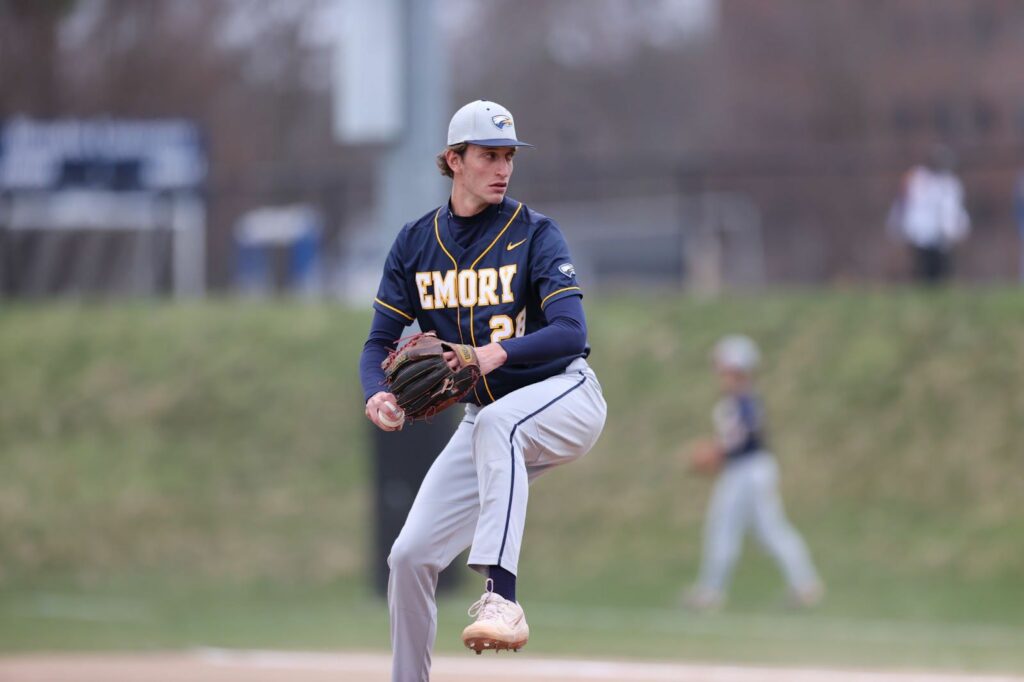
Pitcher Aaron Mishoulam prepares to pitch at bat. (Courtesy of Aaron Mishoulam)
Mishoulam joined Emory’s baseball team during his freshman year, but his first two seasons were also cut short. Despite the shortened seasons, Mishoulam said he was still able to bond with the team. Sharing meals and hanging out with teammates outside of practice and games made him feel more at home. During his freshman season, Mishoulam led the team with seven appearances and two saves.
Schwartz and Mishoulam both played a role in the team’s UAA title win in 2022 that included an 11 out of 12 game winning run. Schwartz hit two or more RBIs in the final four games against Brandeis University (Mass.), and Mishoulam retired all nine batters he faced in two save chances during the Brandeis series. Mishoulam said winning the UAA and getting to play with extremely competitive and well-rounded athletes are highlights of his time at Emory.
According to Mishoulam, he thought about playing DI after watching other teammates make the jump since his freshman year. Emory Baseball Head Coach Mike Twardoski helped Mishoulam with the recruiting process when he got in contact with the coaches at Michigan State University. He said that his teammates and coaches were very supportive of his decision to play DI baseball.
“I definitely want a challenge of playing at a higher level, playing in the Big Ten,” Mishoulam said. “And I want a chance at playing professionally and also making the most out of my time in the classroom and pursuing a career and social work.”
Hudson also has hopes of pursuing a professional career in soccer after he plays his final season next fall. Schwartz and Schner said they will remain around the game after their time playing competitively ends too, whether that means working in the front office for a baseball team or playing pick-up basketball games with friends.

